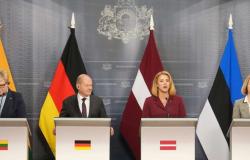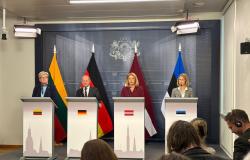On April 30, 2024, in a tripartite meeting, trade unions, employers and the state side will again discuss the desire initiated by the Confederation of Latvian Employers (LDDK) to reduce the amount and number of days of sick pay, which makes Latvian employers uncompetitive among the Baltic states.
On April 5, 2024, at the previous meeting of the Competitiveness and Sustainability Tripartite Cooperation Sub-Council (KITSA), the manner of expression of some employers at times expressed a contemptuous attitude towards the arguments of the Latvian Free Trade Unions Union (LBAS), although specific facts show the exact opposite of what the employers expressed.
This is already indicated by the report of the Ministry of Economy (ME) at the KITSA meeting, that the expenses for all disability leaves (DNL) during the year are only 0.84% of the total labor costs, therefore the impact of DNL on the competitiveness of labor costs is truly negligible.
Latvia has the lowest wages among the Baltic countries, and since 2015 they have also grown the slowest. Calculations made by LBAS experts show that between 2015 and 2023 labor costs in Latvia increased by 909, in Estonia by 1014, and in Lithuania by 1147.
It is important to emphasize that the competitiveness of companies is not only formed by labor costs and labor taxes, but by the total costs of economic activity, including corporate income tax (CIT). Entrepreneurs in Latvia have to pay VAT only when the income is distributed. CIT in Latvia is the most competitive of all three Baltic states. According to the indicators of the Organization for Economic Cooperation and Development (OECD), tax revenues from business income in Latvia in 2022 were 3.2% of the total tax revenues of the Latvian budget, in Lithuania and Estonia they are 7.4% and 5%, respectively. In addition, the forecasts of the Latvian Ministry of Finance on the tax revenues of 2023 show that the CIT provides only 3% of the total tax revenues.
Referring to OECD data on tax revenues, in Lithuania, revenues from corporate income taxes have increased 17.4 times from 2000 to 2022, and in Estonia 10.8 times, while in Latvia alone it has increased 3.6 times. At the same time, revenues from the income of the population in all Baltic countries have grown much more evenly – in Lithuania 5.3 times, in Estonia 5.4 times and in Latvia 6 times. In 2022, tax revenues in Lithuania have reached 1.5 billion from company taxes and 5.1 billion from personal income, in Estonia 596 million and 2.3 billion, respectively, but in Latvia, company income has brought only 378 million, while personal income is 2.3 billion. These data show that, although tax revenues on individual income have grown at similar rates over time in the Baltic States, revenues from company profits in Latvia are significantly lower than in neighboring countries, thus making Latvian entrepreneurs competitive in the region.
The assessment of the “International Tax Competitiveness Index”, which is conducted annually by the US investor-friendly think tank “Tax Foundation”, confirms that Latvia has the second most competitive tax system among the OECD member states. Latvia, on the other hand, has taken the 1st place in the index of business taxes, and in the index of personal taxes Latvia occupies the 3rd place among OECD member states. The weakest indicator for Latvia is in the competitiveness of consumption taxes, where Latvia ranks 27th among OECD member states, which in turn has a greater impact on end consumers, especially in the low and middle wage segment, rather than entrepreneurs.
LBAS completely agrees that increasing competitiveness is one of the main prerequisites for the company’s successful development. However, high competitiveness does not always ensure a high level of profit in a given period of time, because increasing competitiveness requires investments in improving the qualifications of the workforce, new technologies, equipment, research, etc.
Even now, an employee receiving the average salary in Latvia (in 2023 1537 euros – gross) and being sick for 9 days (page A), receives one third less income (- 120 euros), thus the opinion of certain persons that ” being on disability leaves is beneficial”, is to be rejected as absolutely unfounded. The mutual compromise between employers and ministries reduces it by another 33.11 euros. In addition, this offer envisages a reduction of support for the care of an employee as well as a sick child by 5% or 2.29 euros per day at the average wage, which is 22.90 euros in two weeks. Besides, it is sheet B, in Latvia it is paid by the state, but in Estonia by employers. It is important to note that more than 58% and almost 69% of all incapacity for work sheets in Latvia were issued in the first week and in the second week, for taking care of a sick child.
Tags: competitiveness Latvian companies threatened expenses sick leaves
-





